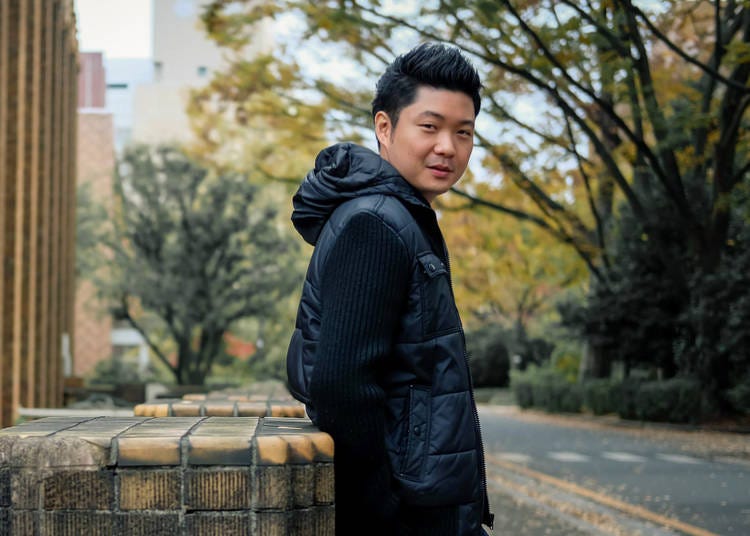
If you ever receive an email from a Japanese person, or started chatting to someone online, or even have a business meeting lined up with a Japanese client, then it is more than likely you have looked at their name and thought “erm, is that a male or female name...?”
If you try to investigate a bit about it, then you will probably find that the more you research about it the more confusing it can get! It is one thing to see a name, say like Satoshi or Kazu, but it is quite another actually knowing if that is a male name or not without going through a list of boy’s names for would-be parents.
Furthermore, it gets a bit strange if you only have a name in kanji to go on, unlike Western names which have fairly fixed spelling, a Japanese boys name’s kanji can be quite fluid – so just putting their name in a site like like Google Translate isn’t necessarily going to give you the correct reading of the name, or make it any clearer whether it is a male name or not.

If we look at the history of Japanese names then actually how names work today appears easier to understand – as names also used to be quite fluid! Everyone had a birth name, but then they changed their name according to their status, employment and even religion. People could change their because of promotions, change of job or even just because they were using a name that they thought was giving them bad luck.
In the 1870s the government formalized the naming system for Japan and at this time many people took on fixed first names and surnames. When Japanese families typically had more children it was also more normal to give boys names with a suffix of ‘ro’ (郎) which means son, so the first son would be ichiro, the second son Jiro, the third son Saburo, and so on.
As the kanji for a name gives it a special meaning this has led to some names having quite an unusual meaning! For example, Michio (道夫) means ‘man on a journey’ while Takeo (武雄) means ‘warrior hero.’ Meanwhile frequently popular boy’s names include Ren, Minato and Yuma. Let’s learn a bit more about names for boys in Japan!
How Japanese boys names work and how parents choose their child’s name!

As briefly explained above, names were changeable in the past with people taking on different names according to a variety of factors including luck, but with the Meiji Restoration in 1868 the new government formalized the naming system for Japan. This meant that everyone had a fixed surname and first name somewhat similar to Western names – but without a middle name.
Interestingly, a consequence of this is that for some people it can be quite hard to trace back their ancestry through history. Furthermore, the name order remained different as well with the surname coming before the first name. Outside of Japan people will use the Western naming order (first name, surname) but in Japan if you are given a business card it is more than likely it will show surname first. Unlike first names, the kanji for surnames is more fixed which allows them to be easily read, this ranges from families whose name is literally Nihon/Nippon (日本 - Japan), to one of the most common surnames Sato (佐藤).
However, although a Japanese surname may have fixed kanji, the first name is another matter. There are literally encyclopedic-like books on kanji for parents-to-be. These list each name and then the kanji that can be used for that name, but an important aspect is how many strokes there are in the kanji character/s. It is a complex issue as it is affected by different factors, but basically the number of strokes it takes to write the kanji character can be seen as lucky or unlucky. In other cases parents like a certain kanji character meaning and so have to find a name they like that incorporates that character.
Another consideration is the Japanese Ministry of Justice’s rules for kanji characters in names, which incorporates a list of kanji characters which can be used in names. The intention is to make sure that people’s names can be easily read or written by everyone else, but an unintended consequence has been an increase in names which can’t be easily read. This contradiction occurred as parents want to give their child with a more unique name so they choose a more obscure reading and combination of kanji characters.
A name isn’t just a name – Japanese unisex names and nicknames
Going back to the question which was raised at the beginning of the article, for someone not from Japan it can sometimes be hard to know just from a name whether that person is male or female, to make matters worse some names are unisex! For example Akito or Kohaku can be for either a boy or a girl, so it is worth taking this into consideration when choosing a name. It is also best to be careful about very similar names; Aki is a girl’s name whereas Aiki is a unisex name. Unfortunately, there is no hard and fast rule for figuring out if a name is male or not.
A cultural factor which also needs to be thought about is nicknames, and this is especially true for international couples, is whether a Japanese nickname version of their child’s chosen name is acceptable in their home country too. For very young children normally the first name will be shortened and –chan added to the end, so Akito might become Aki-chan or even A-chan (Acchan). As they get older girls retain the –chan suffix while boys become –kun, such as Kohaku becoming Koha-kun. This is certainly a problem if something like A-chan means something unpleasant in another language!
Trivia: The Emperor has no surname!
If you thought it was hard enough with figuring out people’s names, then think about the Japanese royal family who don’t have surnames! Every new member of the royal family is just given a first name and a title, so the current emperor is just known as Emperor Akihito in English – though Japanese people never refer to him using this given name. If a member of the royal family marries a non-royal then they take on their spouse’s surname, as such Princess Mako will become Mako Komuro after her wedding.
Top Japanese boys names

So what are some of the most popular names in recent years, as mentioned before Ren is quite popular, but other names include the following:
・Riku, which can be written as 俐虎 (Clever Tiger), 凉空 (Cool Sky) or 凌久 (Endurance) amongst other kanji combinations.
・Haru, which can be written as 陽 (Sun), or 春 (Spring).
Ken, 健 (healthy) or Kenichi, which can be written as 健一 (healthy one) or 研一 (study one).
・Ken is also a useful name for parents looking for a name which works internationally, Alan or Arran can also function as Aran in Japanese. Other names are possible with a bit of flexibility, for example Tom is similar to Tomo and Ron is similar to Ronin. Many people however just choose a name which is easy to pronounce in their native language!
Conclusion
When dealing with a Japanese person, and not being face to face, for someone unfamiliar with Japanese names it can be a bit confusing. You might wonder which is the surname and which is the first name, as in Japan normally the surname comes first but also they sometimes use the Western rule of putting the first name first, and then on top of that you might not be sure if you are speaking with a man or a woman.
In cases where you are only dealing with a name in kanji then you might even struggle to even know what their actual name is! For parents however, they take names very seriously, the kanji would have been chosen after very careful thought as they convey upon their baby son a very special meaning which will follow them throughout life; however it is best not to get too hung up on kanji characters and how to read them – it happens all the time that even Japanese people can’t read a name and have to ask how to read it.
If a name ends with ‘ro’ then must likely it is a male, and if it ends with ‘ko’ then it is probably a female name, as for other names – especially unisex names – it is best just to figure it out as well as you can indirectly!
*Prices and options mentioned are subject to change.
*Unless stated otherwise, all prices include tax.
Popular Tours & Activitiess
Recommended places for you
-
Appealing

Rukku and Uohei
Izakaya
Sapporo / Chitose
-

Kanzenkoshitsuyakinikutabehodai Gyugyu Paradise Sannomiya
Yakiniku
Kobe, Sannomiya, Kitano
-

Kambei Sannomiyahonten
Yakiniku
Kobe, Sannomiya, Kitano
-

Jukuseiniku-to Namamottsuarera Nikubaru Italian Nikutaria Sannomiya
Izakaya
Kobe, Sannomiya, Kitano
-
Goods

Yoshida Gennojo-Roho Kyoto Buddhist Altars
Gift Shops
Nijo Castle, Kyoto Imperial Palace
-

ISHIDAYA Hanare
Yakiniku
Kobe, Sannomiya, Kitano
-
Ad

What Makes Japanese Yakiniku So Darn Good? Guide to Cuts, Heat, and Wagyu Know-How
-
Ad

Japan’s Land of Yokai Monsters and Spooky Stories! A Deep Journey to Mysterious San’in (Tottori & Shimane) for Seasoned Travelers
-

PokéPark KANTO Is Finally Open! Tokyo's New Pokémon World Starts Before You Even Arrive (2026)
by: Guest Contributor
-

To the Holy Land of Kawaii! Odakyu Tama Center Station Is Becoming a Dreamy Sanrio Wonderland
by: Guest Contributor
-
Ad

5 Recommended Wagyu Yakiniku Restaurants in Tokyo: Signature Dishes, Premium Beef, and Secret Sauces
-
Ad

The Latest Guide to "Tourism Mobility": Traveling Japan More Freely. What exactly are Japan’s version of ride-sharing and transit deserts?
-

Dining in Kyoto: Best Restaurants for Kaiseki, Sushi, Cafes & More
-

Cool Off with the Best Summer Beer Gardens in Tokyo: 2019 Edition!
-

Tokyo's Got Honey! 5 Exclusive 'Ginza Honey' Items You'll Love Digging Into at Matsuya Ginza
-

'Is This Really Italian?!' Crazy Things About Japanese Food That Shocked an Italian Traveler
-

Akita Bucket List: 20 Best Things to Do in Akita Prefecture For Tourists (Attractions, Local Foods & Activities)
-

Bring Home Traditional Japanese Kitchen Tools—Stylish & Affordable Finds at 3COINS
- #best sushi japan
- #what to do in odaiba
- #what to bring to japan
- #new years in tokyo
- #best ramen japan
- #what to buy in ameyoko
- #japanese nail trends
- #things to do japan
- #onsen tattoo friendly tokyo
- #daiso
- #best coffee japan
- #best japanese soft drinks
- #best yakiniku japan
- #japanese fashion culture
- #japanese convenience store snacks












